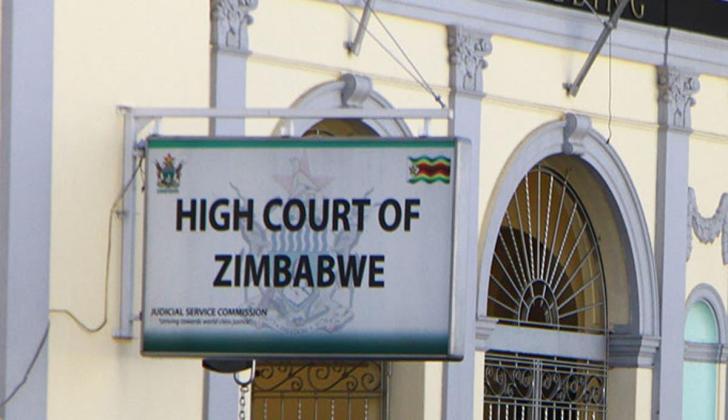News / National
High Court refuses to strike down Patriot Act
22 May 2025 at 08:33hrs |
0 Views

The High Court has dismissed a legal challenge seeking to declare amendments to the Criminal Law (Codification and Reform) Act - widely known as the Patriot Act - unconstitutional, dealing another blow to freedom of expression in Zimbabwe.
The amendments, signed into law by President Emmerson Mnangagwa in 2023, criminalise acts perceived by the government as wilfully injuring Zimbabwe's sovereignty and national interest. The law carries severe penalties, including the death sentence, for what the state deems unpatriotic conduct.
Freeman Chari, a United States-based opposition activist, filed the constitutional challenge against the law, targeting section 22A(2)(b). He named Justice, Legal and Parliamentary Affairs Minister Ziyambi Ziyambi and Attorney-General Virginia Mabhiza as respondents.
Chari argued that the Act's provisions were unconstitutionally vague and violated his constitutional rights, including the freedom of expression, political rights, and media freedom guaranteed under sections 61, 67, and 67 of the Zimbabwean Constitution. He took particular issue with the vague language used to describe criminal conduct, such as "subverting," "upsetting," "overthrowing," or "overturning" a constitutional government, which he said was not sufficiently defined and thus rendered the law void.
However, the respondents strongly opposed the application, asserting that the law's language was clear and precise, targeting only acts of active disloyalty aimed at removing a constitutional government through unconstitutional means.
In his ruling, High Court Judge Regis Dembure emphasised the importance of laws being expressed with clarity to avoid subjective interpretation.
"A law may not be so widely expressed that its boundaries are a matter of conjecture nor may it be so vague that the people affected by it must guess at its meaning. If it does, it will fail to meet the test of validity," Justice Dembure stated.
He added that individuals must reasonably foresee the consequences of their actions, and criminal statutes must clearly define prohibited conduct to ensure lawful compliance.
On the specific challenge, Justice Dembure found no vagueness in the Act's wording.
"While the words 'subverting', 'upsetting', 'overthrowing', or 'overturning' are not defined, that per se does not render the section void for vagueness," the judge ruled.
"The ordinary grammatical meaning of those words can easily be ascertained with sufficient clarity or precision to dispel any notion of vagueness as argued by the applicant."
Justice Dembure concluded that the law clearly demarcates criminal conduct beyond acceptable constitutional means of changing government and provides adequate clarity to citizens on prohibited behaviour.
"The applicant has failed to discharge the onus to show that the provisions of section 22A(2)(b) of the Act are unconstitutionally vague and violate the applicant's fundamental rights or freedoms under sections 61 and 67 of the Constitution," he ruled.
The judgment represents a significant affirmation of the government's position on national security laws and signals ongoing challenges for opposition voices and civil liberties advocates in Zimbabwe.
The amendments, signed into law by President Emmerson Mnangagwa in 2023, criminalise acts perceived by the government as wilfully injuring Zimbabwe's sovereignty and national interest. The law carries severe penalties, including the death sentence, for what the state deems unpatriotic conduct.
Freeman Chari, a United States-based opposition activist, filed the constitutional challenge against the law, targeting section 22A(2)(b). He named Justice, Legal and Parliamentary Affairs Minister Ziyambi Ziyambi and Attorney-General Virginia Mabhiza as respondents.
Chari argued that the Act's provisions were unconstitutionally vague and violated his constitutional rights, including the freedom of expression, political rights, and media freedom guaranteed under sections 61, 67, and 67 of the Zimbabwean Constitution. He took particular issue with the vague language used to describe criminal conduct, such as "subverting," "upsetting," "overthrowing," or "overturning" a constitutional government, which he said was not sufficiently defined and thus rendered the law void.
However, the respondents strongly opposed the application, asserting that the law's language was clear and precise, targeting only acts of active disloyalty aimed at removing a constitutional government through unconstitutional means.
In his ruling, High Court Judge Regis Dembure emphasised the importance of laws being expressed with clarity to avoid subjective interpretation.
"A law may not be so widely expressed that its boundaries are a matter of conjecture nor may it be so vague that the people affected by it must guess at its meaning. If it does, it will fail to meet the test of validity," Justice Dembure stated.
He added that individuals must reasonably foresee the consequences of their actions, and criminal statutes must clearly define prohibited conduct to ensure lawful compliance.
On the specific challenge, Justice Dembure found no vagueness in the Act's wording.
"While the words 'subverting', 'upsetting', 'overthrowing', or 'overturning' are not defined, that per se does not render the section void for vagueness," the judge ruled.
"The ordinary grammatical meaning of those words can easily be ascertained with sufficient clarity or precision to dispel any notion of vagueness as argued by the applicant."
Justice Dembure concluded that the law clearly demarcates criminal conduct beyond acceptable constitutional means of changing government and provides adequate clarity to citizens on prohibited behaviour.
"The applicant has failed to discharge the onus to show that the provisions of section 22A(2)(b) of the Act are unconstitutionally vague and violate the applicant's fundamental rights or freedoms under sections 61 and 67 of the Constitution," he ruled.
The judgment represents a significant affirmation of the government's position on national security laws and signals ongoing challenges for opposition voices and civil liberties advocates in Zimbabwe.
Source - newsday
Join the discussion
Loading comments…
































